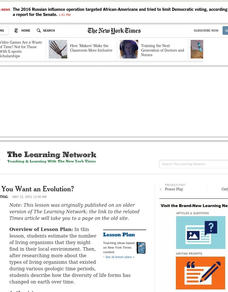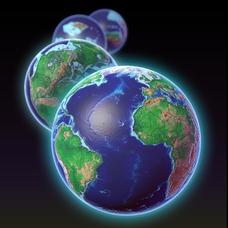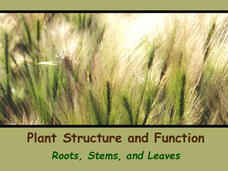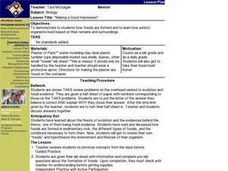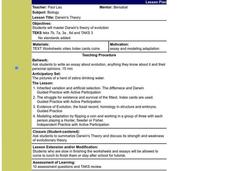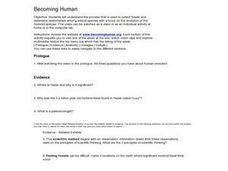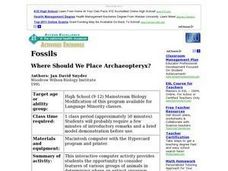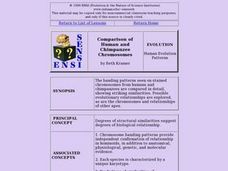Biology Junction
Plant Diversity
Ginkgo trees existed for more than 350 million years, and, at this time, only one species still remains. While plant diversity generally increases over geologic time, some interesting exceptions occur. Young scientists learn about plant...
Curated OER
You Say You Want an Evolution?
Students estimate the number of living organisms they might find in their local environment. After researching the types of organisms that existed during various geologic time periods, students describe how life forms have changed over...
Howard Hughes Medical Institute
EarthViewer
Can you imagine Washington DC and London as close neighbors occupying the same continent? Learners will be fascinated as they step back in time and discover the evolution of the earth's continents and oceans from 4.5 billion years ago to...
Curated OER
Dinosaur Detectives
Students examine amphibian evolution by comparing fossils with a modern-day skeleton. They experience the scientific thought process of drawing conclusions from limited paleontological data. Student groups align the figures with the...
Curated OER
A Tree Full of Ancestors
Students study human evolution and the scientific process. They complete the Origins of Humankind Web activity to become familiar with the hominid species as well as the associated evidence found, in the form of fossils and artifacts.
Curated OER
SORTING ALL SORTS
Students examine how the method of classification is used. For this sorting lesson students take a pre-test, classify organisms and complete a crossword puzzle.
Curated OER
Early Earth History
In this earth history worksheet, students answer 12 questions about geological time, the eras of Earth, the changes taking place in early Earth and the life present during the eras. They also answer 2 questions about the Paleozoic Era.
Biology Junction
Plant Structure and Function: Roots, Stems, and Leaves
Scientists found fossils of plants more than 420 million years old—but plants existed for up to 100 million years prior to these fossils. Learn about the importance of plants to the entire planet. Viewing a presentation helps scholars...
Curated OER
"Making a Good Impression"
Students are shown how fossils are formed and to learn how extinct organisms lived based on their remains and surroundings. They are shown TAKS review problems on the overhead related to evolution and fossil evidence. Students discuss...
Curated OER
Darwin's Theory
Students write an essay about evolution. They summarize Darwin's Theory and discuss its strength and weakness of evolutionary theory. Students discuss the struggle of existence and survival of the fittest. They discuss the evidence of...
Curated OER
Becoming Human
In this evolution activity, learners access a specific website and then answer questions about human evolution based on what they discovered at the website. This activity has 19 short answer questions and 3 essay questions.
Curated OER
Walking Whales
Eighth graders explore the theory of evolution of whales. In this walking whales lesson plan students study a reading packet, divide into groups and respond to given questions.
Curated OER
Where Should We Place Archaeopteryx?
Students classify Archaeopteryx using pictures of actual fossils and scientist representations of how the animal might have looked. They compare Archaeopteryx's characteristics to those of the five extant vertebrate groups to...
Curated OER
Excavating the Past
Students discover how palaeontologists conduct a dig for fossils and how they interpret the age of the fossils. In small groups, they prepare a "dig site" consisting of bones, rocks and soil layered in a cardboard box. They switch boxes...
Curated OER
Studying Fossils
Students hypothesize dinosaur size and speed by looking at dinosaur track way or by measuring a dinosaur models water displacement. In addition, techniques to help students become familiar with the ways paleontologists study fossils can...
Curated OER
Student Guide: Evolution Videodisk from Videodiscovery
Students use this worksheet with the videodisk from Video discovery titled Evolution: Inquiries into Biology and Earth Science.Written because there is no computerized control program available, it is to be used with a standard videodisk...
Curated OER
Physiological Adaptations
Students investigate the concepts of genetics and how it is tied to the variations found within different species and how it is tied to adaptations. They review the theory of evolution and factors found to help create variation. The...
Curated OER
Understanding the Geologic Timescale
Students identify and analyze how the geologic time scale was developed by investigating 11 periods of time and the vast expanse of time of the Earth's existence. They study their period, determine the important factors indicative to...
Curated OER
Comparison of Human and Chimpanzee Chromosomes
Pupils actively engage in the careful analysis of chromosome banding patterns and identify examples of inversion in homologous chromosomes.
American Museum of Natural History
Paleontology Books
A list of 11 books about paleontology offers titles, authors, and a brief description of the tale.
Edinburgh UNESCO City of Literature Trust
The Lost World
Fans of Sherlock Holmes may be surprised to learn that in addition to stories of the famous deductionist, Sir Arthur Conan Doyle is also the creator of Professor Challenger. An irascible, unpredictable scientist, Challenger was featured...
Discovery Education
The Time of Our Life
Mammals are some of the newest organisms to appear on Earth. Young scholars complete an activity that results in a timeline showing the appearance of different types of living organisms. Provided with a list that spans from prokaryotes...
Curated OER
Life Has A History
In this biology worksheet, students identify and match various classes of species found today. Then they explain why biodiversity exists today on earth and define evolution. Students also describe who a paleontologist is and what they do.
Curated OER
Digging Into Science Lesson Plans
In this biology worksheet, students identify and write the various species that are still present today. Then they define evolution using three words. Students also describe what a fossil is and give some examples related to a particular...



